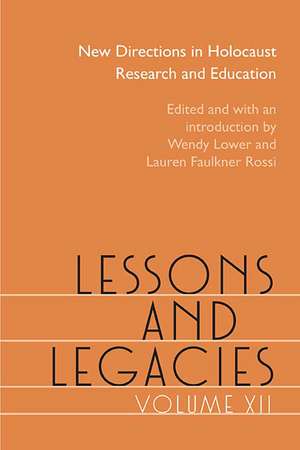Lessons and Legacies XII: New Directions in Holocaust Research and Education: Lessons & Legacies, cartea 12
Editat de Wendy Lower, Lauren Faulkner Rossien Limba Engleză Hardback – 14 feb 2017
Lessons and Legacies XII explores new directions in research and teaching in the field of Holocaust studies. The essays in this volume present the most cutting-edge methods and topics shaping Holocaust studies today, from a variety of disciplines: forensics, environmental history, cultural studies, religious studies, labor history, film studies, history of medicine, sociology, pedagogy, and public history. This rich compendium reveals how far Holocaust studies have reached into cultural studies, perpetrator history, and comparative genocide history. Scholars, laypersons, teachers, and the myriad organizations devoted to Holocaust memorialization and education will find these essays useful and illuminating.
Preț: 596.37 lei
Preț vechi: 774.50 lei
-23% Nou
Puncte Express: 895
Preț estimativ în valută:
114.11€ • 124.35$ • 96.16£
114.11€ • 124.35$ • 96.16£
Carte indisponibilă temporar
Doresc să fiu notificat când acest titlu va fi disponibil:
Se trimite...
Preluare comenzi: 021 569.72.76
Specificații
ISBN-13: 9780810134492
ISBN-10: 0810134497
Pagini: 456
Ilustrații: 4 b-w illos
Dimensiuni: 152 x 229 x 33 mm
Greutate: 0.75 kg
Ediția:1
Editura: Northwestern University Press
Colecția Northwestern University Press
Seria Lessons & Legacies
ISBN-10: 0810134497
Pagini: 456
Ilustrații: 4 b-w illos
Dimensiuni: 152 x 229 x 33 mm
Greutate: 0.75 kg
Ediția:1
Editura: Northwestern University Press
Colecția Northwestern University Press
Seria Lessons & Legacies
Notă biografică
WENDY LOWER is the John K. Roth Professor of History at Claremont McKenna College and director of the Mgrublian Center for Human Rights.
LAUREN FAULKNER ROSSI is a professor of history at Simon Fraser University in Vancouver, Canada.
Cuprins
Foreword, by Theodore Zev Weiss
Foreword, by Theodore Zev Weiss (forthcoming)
Introduction, by Lauren Faulkner Rossi and Wendy Lower
Jan T. Gross, Opportunistic Killings and Plunder of Jews by their Neighbors -- a Norm or an Exception in German Occupied Europe?
Dagmar Herzog, The Obscenity of Objectivity: Post-Holocaust Antisemitism and the Invention of Post-Traumatic Stress Disorder
I. New Cultural Approaches to the Holocaust
Amos Goldberg, Rumors in the Ghettos: a Case Study of Cultural History
Doris L. Bergen, I Am (Not) to Blame: Intent and Agency in Personal Accounts of the Holocaust
Steven Carr, "To Encompass the Unseeable": Foreign Film, Taste Culture, and the American Encounter with the Postwar Holocaust Film
Alon Confino, A World Without Jews: Culture and the Holocaust
II. Contemporary Controversies and Their Historical Origins
John Paul Himka, Former Ukrainian Policemen in the Ukrainian National Insurgency: Continuing the Holocaust Outside German Service
Ludivine Broch, The SNCF Affair: Cheminots in the Divided Memories of Vichy France
Mark Webber, Keep Your Distance: "Ethical Duplicity" and the Holocaust
III. Recovery and Loss
Perla Sneh, Khurbn Yiddish, an absent absence
Elizabeth Anthony, The First Returnees: Holocaust Survivors in Vienna in the Immediate Postwar Period
Karel Berkhoff, The Dispersal and Oblivion of the Ashes and Bones of Babi Yar
IV. The Holocaust and Social History: Gender and the Family
Martina Cucchiara, Jewish Girls in Catholic Schools in Nazi Germany, 1933-1938
Natalia Aleksiun, Daily Survival: Social History of Jews in Family Bunkers in Eastern Galicia
Rachel Century, Secretaries, Secrets and Genocide: Evidence from the Post-War Investigations of the Female Secretaries of the RSHA
V. Reconsidering Perpetrators
Ed Westermann, Hitler's Ostkrieg and the Indian Wars: Comparing Military Strategies of Conquest and Annihilation
Idit Gil, Intrigues and Conflicts of Interest as to the Exploitation of Jewish Labor in Radom (1942-1943)
Lukas Meissel, Not 'How Was it Possible', But 'Who Made It Possible': The Topic of Perpetrators in Holocaust Education in Austria
Foreword, by Theodore Zev Weiss (forthcoming)
Introduction, by Lauren Faulkner Rossi and Wendy Lower
Jan T. Gross, Opportunistic Killings and Plunder of Jews by their Neighbors -- a Norm or an Exception in German Occupied Europe?
Dagmar Herzog, The Obscenity of Objectivity: Post-Holocaust Antisemitism and the Invention of Post-Traumatic Stress Disorder
I. New Cultural Approaches to the Holocaust
Amos Goldberg, Rumors in the Ghettos: a Case Study of Cultural History
Doris L. Bergen, I Am (Not) to Blame: Intent and Agency in Personal Accounts of the Holocaust
Steven Carr, "To Encompass the Unseeable": Foreign Film, Taste Culture, and the American Encounter with the Postwar Holocaust Film
Alon Confino, A World Without Jews: Culture and the Holocaust
II. Contemporary Controversies and Their Historical Origins
John Paul Himka, Former Ukrainian Policemen in the Ukrainian National Insurgency: Continuing the Holocaust Outside German Service
Ludivine Broch, The SNCF Affair: Cheminots in the Divided Memories of Vichy France
Mark Webber, Keep Your Distance: "Ethical Duplicity" and the Holocaust
III. Recovery and Loss
Perla Sneh, Khurbn Yiddish, an absent absence
Elizabeth Anthony, The First Returnees: Holocaust Survivors in Vienna in the Immediate Postwar Period
Karel Berkhoff, The Dispersal and Oblivion of the Ashes and Bones of Babi Yar
IV. The Holocaust and Social History: Gender and the Family
Martina Cucchiara, Jewish Girls in Catholic Schools in Nazi Germany, 1933-1938
Natalia Aleksiun, Daily Survival: Social History of Jews in Family Bunkers in Eastern Galicia
Rachel Century, Secretaries, Secrets and Genocide: Evidence from the Post-War Investigations of the Female Secretaries of the RSHA
V. Reconsidering Perpetrators
Ed Westermann, Hitler's Ostkrieg and the Indian Wars: Comparing Military Strategies of Conquest and Annihilation
Idit Gil, Intrigues and Conflicts of Interest as to the Exploitation of Jewish Labor in Radom (1942-1943)
Lukas Meissel, Not 'How Was it Possible', But 'Who Made It Possible': The Topic of Perpetrators in Holocaust Education in Austria
Descriere
The essays in Lessons and Legacies XII present the most cutting-edge methods and topics shaping Holocaust studies today, from a variety of disciplines: forensics, environmental history, cultural studies, religious studies, labor history, film studies, history of medicine, sociology, pedagogy, and public history.





